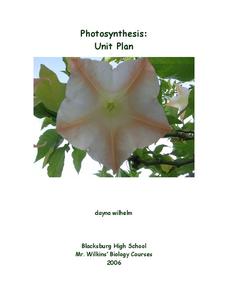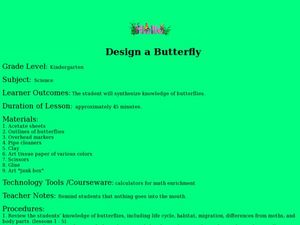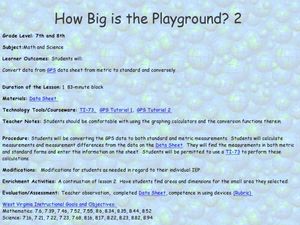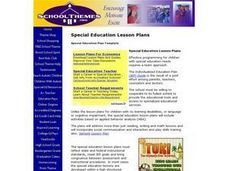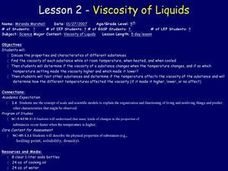Curated OER
Photosynthesis
We all know photosynthesis happens, but why should we care? Here is a unit that covers everything young scholars need to know about photosynthesis. Hands-on activities, assessments, and lectures guide pupils though the physiology of...
Curated OER
Genetic Variation Worksheet
Fill- in-the-blank, labeling, and short answer questions make up this well-written cell division worksheet. Neat diagrams of chromosomes and dividing cells are included. Junior biologists show what they know about reproduction, meiosis,...
Curated OER
Incomplete Dominant and Codominant Traits Worksheet
A two-page instructional activity provides seven Punnett squares for practice in determining genotypes and phenotypes. Each is an example of incomplete dominance or codominance. After your bright biologists have mastered Punnett squares,...
Curated OER
Adaptation Worksheet
Adaptation or acclimation? Young ecologists determine which is being exemplified in twenty questions. When teaching about adaptations, make sure to talk about acclimation, a short-term learned response to a change in the surroundings....
Curated OER
Design a Butterfly
Students access prior knowledge of butterflies. In this butterfly lesson, students create butterflies and compare and contrast their butterflies. Students describe the various body parts.
Curated OER
Life Cycle of a Monarch Butterfly
Students identify the stage of the butterfly's life cycle. In this life cycles lesson, students create a KWL chart about monarch butterflies. Students observe monarch caterpillars in an aquarium and identify the various stages of growth.
Curated OER
How Big is the Playground: Creating a Map
Students create a topographical map of an area outside of the school. In this mapping instructional activity, students compile data on angles, distances, and key landmarks for a predetermined area on the school grounds to create a map...
Curated OER
How Big Is The Playground?
Students calculate the standard and metric measurements of a playground. In this measurement lesson, students use GPS coordinates and graphing calculators to determine the dimensions of an area outside of the school in both standard and...
Curated OER
Parts of a Plant
First graders discover the parts of a plant. In this science lesson, 1st graders identify and label the parts of a plant and record their findings on a word processor.
Curated OER
ABC and 1-2-3 Farming
Students demonstrate how to alphabetize animal names. In this word study lesson, students identify animals that live on the farm and conduct a favorite farm animal survey. Students order animal pictures in alphabetical order.
Curated OER
Harvest the Facts
Learners discover heath problems caused by tobacco. In this human health lesson, students identify the many diseases tobacco use causes and how to prevent such diseases. Learners investigate the organs in the human body...
Curated OER
Special Education Plan
Special needs students practice completing everyday tasks such as organizing a day plan, reading a clock and completing simple math problems. They define the proper learning techniques for their disorder and utilize props in...
Curated OER
Report on Desert Plant or Animal
Students are introduced to desert plants and animals. They demonstrate that the name of an organism does not always match the object. Students perform a guided internet search in order to complete a report.
Curated OER
Atomic Structure
Students explore atomic structure. They observe a video on atomic structure and complete a Venn diagram on the parts of the atom. Students create their own graphic organizer on the parts of the atom using Inspiration software.
Curated OER
Have You Looked Outside? Lesson #5- Graphing Weather Conditions
First graders study daily weather changes. In this weather and graphing lesson, 1st graders chart the daily weather for a month using stickers or weather symbols. They graph the weekly weather so that at the end of the month students...
Curated OER
Ocean of Words
Students explore aspects of the ocean. In this ocean wildlife lesson plan, students watch a power point presentation on the ocean. Students complete a worksheet on what they learned.
Curated OER
Penguin Presentations
Students explore the attributes of penguins. In this penguins lesson, students participate in a penguin scavenger hunt and take notes on the information they encounter. Students prepare reports about their findings and share them with...
Curated OER
What's the Earth Worth?
Students are able to identify natural resources from a shared reading by highlighting, scoring at least a 3 on a 4 point rubic. They describe in journal entries, after reading the book Amelia Bedelia Goes Camping or Curious Geogre Goes...
Curated OER
Plants, Animals and Our Environment
Students draw and label the basic needs of animals. They draw and label the basic needs of plants. Students understand the basic needs of plants and animals are not only the same, but are interrelated. They know that the environment...
Curated OER
States of Matter
Fourth graders define the term matter. They compare properties of solids, liquids, and gases. They describe how matter changes from one state to another. They classify objects as either solid, liquid, or gas.
Curated OER
Viscosity of Liquids
Fifth graders discuss the properties and characteristics of different substances. They find the viscosity of each substance while at room temperature, when heated and when cooled. They determine if the viscosity of a substance changes...
Curated OER
What is a Seed?
First graders identify the parts of a seed. In this plant biology instructional activity, 1st graders are given a seed and identify each part of the seed by using a hand lens. Students plant a seed and graph the growth.
Curated OER
Egg to Butterfly
Students examine the life cycle of the butterfly through literature. In this butterfly life cycle instructional activity, students listen to a read aloud of Eric Carle's, The Very Hungry Caterpillar, and discuss the life cycle shown in...
Curated OER
Bird and Breakfast
Students examine winter birds. In this KWL chart lesson, students fill out the chart and view a PowerPoint presentation. Students then complete the chart and discuss winter birds.
